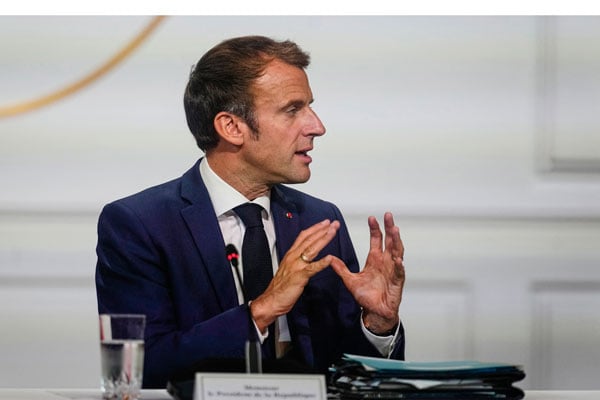Prime
Macron hosts African leaders ahead of expected Mali withdrawal

French President Emmanuel Macron attends the One Planet Summit videoconference meeting at the Elysee Palace in Paris on October 4, 2021. PHOTO/AFP
What you need to know:
- Paris, however, intends to continue the anti-jihadist fight in the wider region, where movements affiliated with Al-Qaeda or the Islamic State group have retained an ability to attack despite the elimination of key leaders.
President Emmanuel Macron hosts African leaders on Wednesday ahead of an expected announcement that France is withdrawing its troops from Mali after an almost decade-long deployment to battle a jihadist insurgency.
Multiple sources have told AFP that Macron will announce that French forces will leave Mali and redeploy elsewhere in the Sahel region, following a breakdown in relations with the ruling junta.
It remains unclear when, and how, Macron will make the announcement, which could come as part of Wednesday's meeting or when he travels to Brussels on Thursday for a two-day EU-Africa summit.
The deployment in Mali of a European force known as Takuba -- a project driven by Macron to spread the security burden in the troubled region -- will also come to an end, the sources said.
The Mali deployment has been fraught with problems for France, with 48 of the 53 soldiers killed during its Barkhane mission in West Africa losing their lives in the country.
France initially deployed troops against jihadists in Mali in 2013 but the insurgency was never fully quelled, and new fears have now emerged of a jihadist push to the Gulf of Guinea.
The announcement of the withdrawal comes at a critical time for Macron, just days ahead of a long-awaited declaration from the president that he will stand for a new term in April elections.
It also coincides with Macron seeking to take a lead role in international diplomacy as he presses Russia to de-escalate in the standoff over Ukraine.
Multiple missions
The working dinner hosted by Macron on Wednesday starting at 1930 GMT will bring together the leaders of France's key allies in the Sahel region -- Chad, Mauritania and Niger.
Officials from Mali as well as Burkina Faso, which also recently experienced a coup, have pointedly not been invited.
Other African leaders will also be present along with European Council President Charles Michel and European Commission chief Ursula von der Leyen, as well as Italian Prime Minister Mario Draghi.
There are a total of 25,000 foreign troops currently deployed in the Sahel.
They include around 4,300 French troops, which under a reduction announced last year are due to fall to around 2,500 in 2023 from a peak of 5,400.
Other forces deployed in Mali are the UN peacekeeping mission MINUSMA established in 2013 and the EUTM Mali, an EU military training mission that aims to improve the Malian military's capacity in fighting terrorists.
Some 2,400 French soldiers are deployed in Mali as part of the Barkhane operation as well as the EU Takuba force set up in 2020, which was intended to increase in numbers as French deployment was scaled back.
According to a French source, who asked not to be identified by name, even after departure France will for a period provide MINUSMA and EUTM with support in the air and medical back-up.
'Reinvent partnership'
Relations between France and Mali have plunged to new lows after the junta led by strongman Assimi Goita refused to stick to a calendar to a return to civilian rule.
The West also accuses Mali of using the services of the hugely controversial Russian mercenary group Wagner to shore up its position, a move that gives Moscow a new foothold in the region.
Especially with the French elections looming, Macron's priority is to ensure that any withdrawal does not invite comparisons with the chaotic American departure from Afghanistan last year.
Paris, however, intends to continue the anti-jihadist fight in the wider region, where movements affiliated with Al-Qaeda or the Islamic State group have retained an ability to attack despite the elimination of key leaders.
"We need to reinvent our military partnership with these countries," said a French presidential source, asking for anonymity.
"It is not a question of moving what is being done in Mali elsewhere, but of reinforcing what is being done in Niger and of supporting the south more."




